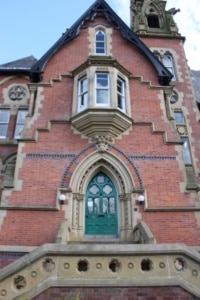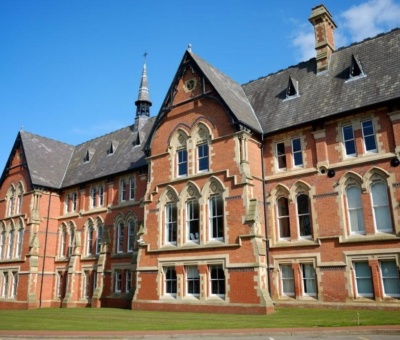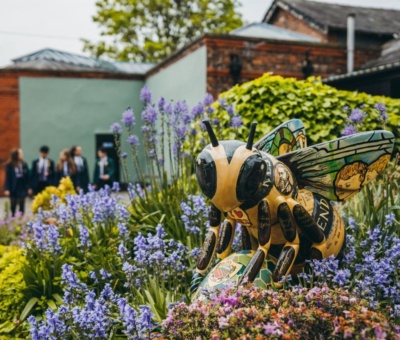Finding Your Spark – Charlie Troup, Class of 2012

Charlie Troup, Class of 2012, took up a place studying History & Politics at Oxford before returning a year later to study for the MPhil in Modern British & European History. Here, Charlie shares his passion for learning, his thoughts on how today’s politics become tomorrow’s history and advice for young people looking for their ‘spark’.
What was your spark? What or who was the driver which has ultimately led to where you are now?
I’ve had lots of different interests at different times so struggle to think of one thing that was my ‘spark’. I think mine was a determination to resist specialising too narrowly, and to let myself indulge my curiosity. This does mean that I’ve got to ‘where I am now’ via some quite painful decisions!
When I arrived at CHS for Sixth Form in 2010, I was set on becoming an orchestral conductor. I gradually became more interested in History and English Literature, and I found choosing what to study at university extremely difficult. In the end my undergraduate degree was in History & Politics.
I’m currently studying towards an MPhil in Modern History at Oxford, but my interests still sit at the intersection of several disciplines. At the moment, I’m interested above all in the history of political ideologies. This has a ‘political philosophy’ element, of course, but I also seek to study the diverse forms and languages of ideas as they move through societies and structure people’s understandings of the political world they inhabit – something far wider than the study of high theoretical texts alone.
So perhaps my ‘spark’ has been keeping my interests broad – something I’m still trying to do!
What led you to the study of the Thatcher-era Conservative Party?
I studied a paper in my final year as an undergraduate on the history of ‘neoliberalism’ – quite an intimidating word which basically refers to the renaissance of free-market economics in the 1970s, and especially the increasing application of its economistic models to political and social questions.
British political language in the 20th century never changed as dramatically, or with such lasting implications, as during the Thatcher premiership. That’s what attracted me to the period in general.
I was led to my current project, as is so often the case in academia, by discovering a niche! There has been an awful lot written about the political ideas of ‘Thatcherism’; and quite a lot about how the British left tried to theorize a response to its intellectual challenges. I realised that there has been practically no academic interest in British conservatives who developed a critical intellectual response to Thatcherism from a right-wing perspective.
One of the figures I’m particularly interested in is Ian Gilmour, a Conservative MP from 1962-1992. He regarded Thatcherism as a callous and doctrinaire betrayal of the pragmatic British conservative tradition that he saw himself as representing. Thatcher, in turn, branded his supporters as ‘wets’. By the time of his death in 2007, he was said to regard himself as to the left of New Labour on economic questions. He’s a fascinating example of how the principles governing British politics have changed since the 1970s.
What has it been like to study History & Politics in the current era of surprising and unexpected political twists and turns?
Fascinating; and sobering. I was teaching a Politics course in London last summer, and we basically had to rewrite the syllabus. I try to resist the temptation to make sweeping predictions, though, and won’t hesitate to say that I’m still trying to understand Brexit, Trump and the like.
Lots of people want to look to historians to tell us how to understand our contemporary moment, but they shouldn’t expect too much. Historians make terrible fortune-tellers.
How do you think future politics students and academics will view today’s political events?
I do think that 2016 will come to be seen as a defining year in the political consciousness of a whole generation – like 1945, or 1968. We’re having to face up to how deep and apparently insoluble some of our social and political divides are – and how little mutual understanding there is across these.
Polling shows that one of the strongest indicators of this cultural divide is a university education – something that people considering an academic career, like myself, should think very carefully about. Humanities departments are full of earnest folk who see their role as reflecting critically upon social questions to furnish good public debate – ‘public engagement’ etc. – and to generate solutions. But one of the things that academics will look back as having learned in 2016 is that these ‘solutions’ are seen by many as nothing more than the expression of a vested interest. It remains to be seen whether they can face up to the implications of this.
What learning habits did you develop at CHS?

I learned not to turn anything down! I’d gone to Bramhall High, an excellent secondary school that had really gone out of their way to cater for me. But when I arrived at CHS the resources and opportunities amazed me, and it made me so motivated to get the most out of the two years I had in the Sixth Form. So, whilst I was working hard, I learned to be rounded – and most importantly, happy.
CHS is not a hothouse.
A poor balance in life can make sparks burn out.
How would you describe life at Oxford? How might studying there differ from other universities?
I had a wonderful time as an undergraduate at Oxford. I was apprehensive about what the other students would be like – but when I arrived, I met so many people who were so normal and yet so impressive. I remember meeting a Biochemist on my first night who knew far more about politics than I did!
The system here is peculiarly intense. The terms are very short, and each week culminates in an essay and a tutorial. There is pressure: but it spurs you on to cover so much material, and colleges are very supportive environments.
I would say that the work-life balance is harder to get right – I had lots of friends from school who did a better job of this than me, whilst studying at brilliant universities. But I don’t regret anything about the experience, and it’s brilliant to be back again as a postgraduate.
How do you think your rounded attitude to life and learning has helped you progress? Why not stick to one thing that you excel at and focus all your efforts on that?
Breadth is healthy, and needn’t come at the expense of rigour. I spent last year teaching in a French high school, where the system is much more rigid: the choices you make aged 15 put you on a path that is difficult to deviate from, and your university choice in most cases seals the deal on your future.
So many of my students loved History and Literature, but never considered studying them at university because they didn’t want to become history teachers. I found that very sad.
I think having a ‘spark’ is about a natural curiosity for things, and that is valuable in and of itself. You don’t nourish this by shutting things off, and treating learning as an exercise in skills-development. You nourish it by being open to the world.
What advice could you give young people today who are looking for their ‘spark’?
Try things out – whatever takes your fancy, and don’t narrow yourself too early. When you do find something that you love, take it into your own hands. Read, talk to other people, and ask yourself questions about it. If something else sparks your interest down the line – don’t be afraid to do that as well!
Read another Old Wac story here!
Alternatively, if you’re also from the CHS Class of 2012, join CHS Community today to connect with classmates and keep up to date with reunions!


